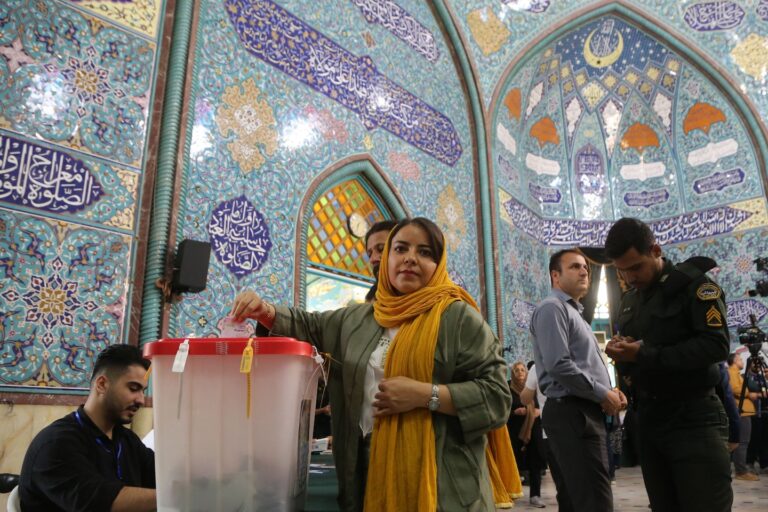Analysts say the outcome is difficult to predict, but continued low turnout is likely to hurt reformist candidates more than conservatives. Several Iranians who abstained from voting told the Washington Post that they would have voted for the reformist Pezeshkian rather than the ultraconservative Jalili.
“Elections in Iran have largely lost their meaning,” said Mehdi Mahmoudian, a 46-year-old Iranian political activist who did not vote in the early elections and said he would not vote in the runoff. Mahmoudian said elections in Iran have begun to resemble “a religious ritual” rather than a serious political exercise.
In a rare statement, Iran’s Supreme Leader Ayatollah Ali Khamenei addressed the low voter turnout ahead of the runoff but said it was not a sign of discontent with his government.
TO CATCH UP
Stories to keep you informed
“It is wrong to assume that those who abstained in the first round are opposed to the Islamic regime,” he said in a statement Wednesday.
As voting began on Friday, state media broadcast videos of voters lining up outside polling stations across the country. Similar reports were broadcast during last week’s vote, before official figures showed a low turnout.
Political engagement in Iran has steadily declined in recent years. Before last week’s runoff, 48% of registered voters had cast ballots in the 2021 presidential election. Turnout was still above 70% in 2017, according to state media reports.
For some Iranians, refusing to vote is an act of opposition in a country that violently suppresses political protests. Others say they are politically apathetic after elected officials have repeatedly failed to prevent a deterioration in social and economic conditions.
“People have understood that participation is futile and that the election results are not valid, so of course they don’t want to participate anymore,” Mahmoudian said. Many of those who don’t vote do so in the hope that this act of protest will eventually force change, but Mahmoudian admits he’s not sure this approach will be effective.
At presidential rallies and debates, Pezeshkian has spoken of voter apathy. “I will do everything I can to pay attention to those who have not been seen by the powerful and whose voices are not heard,” he told supporters this week.
Rozhin, a 33-year-old content creator from Tehran who supports Pezeshkian, said she believes the different visions represented by the two candidates could motivate higher turnout.
“A lot of people who didn’t vote in the first round are voting in the second,” she said, adding that Jalili’s presence on the ballot is concerning for many Iranians who feel threatened by her conservatism.
Amirhossein, a Tehran worker who supports Jalili, believes the decline in political engagement in Iran is due to false information spread by the media.
“The low turnout is mainly due to propaganda by foreign media trying to scare people about living conditions in Iran,” he said, comparing international media coverage of Iran today to Western political reporting on the Soviet Union during the Cold War. Both Rozhin and Amirhossein spoke on condition that only their first names be used for fear of reprisals.
Iran’s snap elections, triggered by the death of President Ebrahim Raisi in a helicopter crash in May, are unlikely to bring about radical change in the country, in part because the Iranian president cannot set policy. But the two candidates have different views on issues that matter to voters. During a presidential debate, Jalili dodged the question when asked about Iran’s strict enforcement of its mandatory dress code for women. Pezeshkian said Iran needs to change “the idea that women are second-class citizens.”
The two candidates also differ on how Iran should interact with the outside world. Pezeshkian advocates greater engagement with the West to ease the country’s economic crisis, while Jalili proposes strengthening ties with its allies, Russia and China, to resist sanctions.
Despite other limitations, Iran The president can set the tone for policy and exercise some economic control.
Iran’s economy is struggling, crippled by sanctions and plagued by high inflation. Regional tensions also remain high as Iranian-backed groups in Gaza, Lebanon and Yemen clash with Israel and its allies.
“Today, there are two visions of the country in this election. What should the future look like today?” Jalili asked a group of his supporters at a campaign rally this week. The vision presented by his opponent, he said, was one of “despair and ‘we can’t.’”
“But another way is to choose a path to the future that is the path of martyrs,” he said. “Weakness cannot be solved by weakly begging a foreign country. We must resolve this situation by force.”


